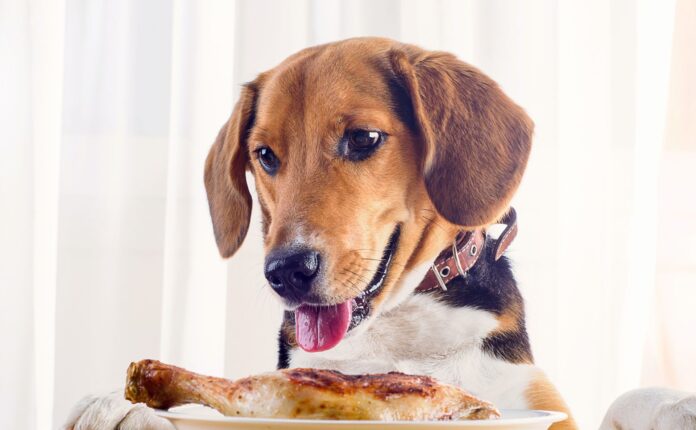Listen up fellow puppy parents! We’ve all been there – those adorable puppy eyes begging for a bite of our crispy, juicy fried chicken. But before you give in to that cute little face let’s talk about whether fried chicken is actually safe for your furry friend.
The Quick Answer
Nope, puppies shouldn’t eat fried chicken! While it might seem like a yummy treat it’s actually not a good idea at all.
Why Fried Chicken Is a Big No-No for Your Pup
1. That Greasy Situation
Let’s be real – fried chicken is basically swimming in oil Here’s what all that grease can do to your puppy – Cause nasty tummy troubles – Lead to pancreatitis (super painful inflammation)- Make them gain unnecessary weight- Give them the runs (nobody wants that!)
2. The Dangerous Coating
The crispy coating might be your fave part, but it’s trouble for puppies:- Contains tons of salt- Often has garlic and onion powder (toxic for dogs!)- Way too many spices their tummy can’t handle- Super high in calories
3. Bone Alert! ⚠️
Here’s something scary – chicken bones from cooked chicken (especially fried) are super dangerous:- They splinter easily- Can get stuck in their throat- Might puncture their digestive system- Could cause serious internal damage
What Happens If Your Puppy Sneaks Some Fried Chicken?
Keep an eye out for these symptoms:1. Vomiting2. Diarrhea3. Lethargy4. Loss of appetite5. Excessive thirst
If you notice any of these, especially after they’ve eaten fried chicken bones, call your vet ASAP!
Safe Chicken Alternatives for Your Puppy
Want to give your pup some chicken? Try these instead:- Plain boiled chicken (no seasonings!)- Baked chicken (no oil or spices)- Store-bought puppy treats with chicken- Raw chicken (but talk to your vet first!)
How to Prepare Safe Chicken for Your Puppy
Here’s a simple recipe your pup will love:1. Boil plain chicken breast2. Remove ALL bones3. Cut into tiny, puppy-sized pieces4. Let it cool completely5. Serve as an occasional treat
Tips for Treating Your Puppy Right
Do’s:
- Stick to puppy-specific treats
- Use small portions for training
- Keep treats to 10% of daily food intake
- Always supervise treat time
Don’ts:
- No table scraps
- Skip the fast food
- Avoid human seasonings
- Never feed cooked bones
What About Other Human Foods?
While we’re talking about fried chicken, let’s clear up some other common foods:
Safe Human Foods for Puppies:
- Plain cooked turkey
- Raw carrots
- Apple slices (no seeds!)
- Plain pumpkin
- Plain sweet potato
Dangerous Human Foods:
- Chocolate
- Grapes/raisins
- Onions/garlic
- Avocados
- Macadamia nuts
When to Call the Vet
Don’t mess around – call your vet if:- Your pup ate chicken bones- They’re showing signs of distress- There’s prolonged vomiting/diarrhea- They seem unusually lethargic- You’re just not sure and worried
The Bottom Line
Look, I get it – we all wanna spoil our fur babies! But fried chicken ain’t the way to do it. Stick to safe, healthy treats made specially for puppies, and save the fried chicken for yourself!
FAQs About Puppies and Fried Chicken
Q: What if my puppy only ate a tiny bit?A: Even a small amount can cause tummy troubles. Watch them closely for any symptoms.
Q: Can puppies eat KFC?A: Absolutely not! Fast food chicken is even worse – more salt, spices, and preservatives.
Q: How long should I wait before feeding my puppy if they ate fried chicken?A: Wait a few hours and monitor them. If they seem okay, offer small amounts of their regular food.
Q: What’s the best treat for training puppies?A: Small, soft treats made specifically for puppies are best. They’re the right size and properly balanced.
Remember, when in doubt, always check with your vet! They know what’s best for your specific pup and their needs. Keep your furry friend safe and healthy by sticking to proper puppy food and treats. Your pup might give you the sad eyes now, but their healthy future is worth saying no to that fried chicken! ❤️
Disclaimer: This article is for informational purposes only. Always consult with your veterinarian about your puppy’s specific dietary needs.












